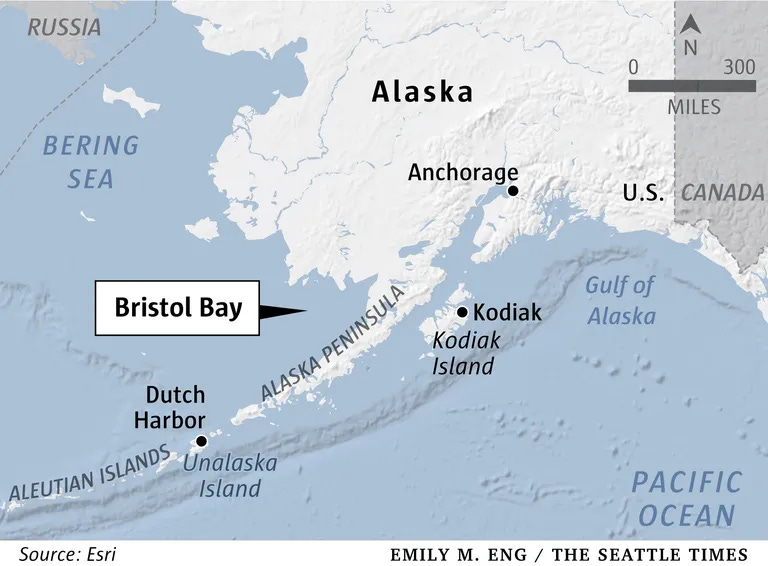Learning to Swim Upstream in the Waters of Alaska: Interview with Sockeye Servings Founder, Captain Tara Hines
This week’s interview is with Captain Tara Hines, the founder of Sockeye Servings. Each summer aboard her fishing vessel, Tara harvests wild sockeye salmon in the waters of Bristol Bay, Alaska before spending the fall selling her catch across Montana and Washington.
Tara caught the entrepreneurial bug early in life and fell in love with the fishing world during a summer spent crewing in Alaska, following her freshman year of college. By the time she completed her degree, Tara had collected a variety of fishing experiences, including a stint learning mechanical knowledge on the East Coast, and had saved up enough to buy her first boat. She dove in head first, made it through her first season, and hasn’t looked back since. It’s now been eight years since that first season!
There was so much I was curious to know about Tara’s story. What was it like to captain her own boat that first year? How did she manage the intensity of a high-pressure environment while climbing the beginner’s learning curve? How has life as a fishing captain shaped and transformed her relationship with uncertainty? What was it like to be one of the few female captains in a male-dominated industry? How has she learned to trust herself?
We had a wide-ranging conversation and chatted about:
Tara’s path to buying her first boat
The mindset that got her through her first year in business
Learning to own where’s she at
How being one of the few female captains in Alaska motivates her
What’s she learned about being a good boss
The new challenges she’s taking on with her business
Note: The following interview has been lightly edited for clarity and length. While every effort has been made to preserve the integrity of the conversation, please be aware that the quotes may not be verbatim but reflect the essence of the dialogue.
What are you up to in life right now?
I’m currently in my off-season. January and February are my self-care months. I'm in Alaska from May through August, and those months are extremely hectic. I start prepping to go back up there in March, and then spend the fall selling and delivering the fish throughout Montana and Washington. I’m always running around so these are the 2 months I actually get to be home and do quieter things. I'll allow myself the time to sit down and work on a puzzle which is difficult for me because I'm not very good at slowing down. I'm high energy and normally off doing things like snowmobiling and cross-country skiing.
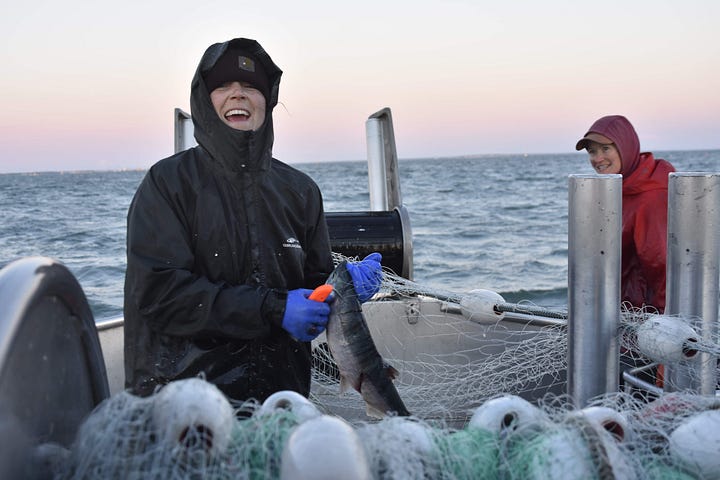
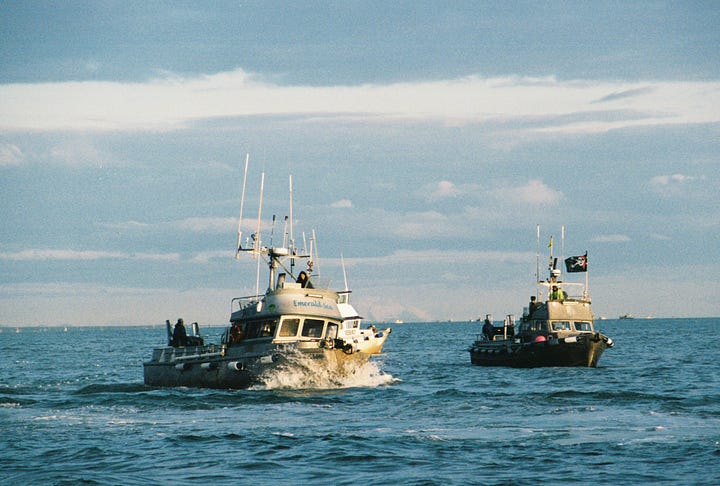
What led you to become a fishing captain?
There are lots of pieces to that puzzle, but my mom will be glad that I start the story this way. She loves telling it. As a kid, when people would ask me what I wanted to be when I grew up, I’d just say, “a boss.” I didn’t know a boss of what, and I don’t think I knew what it meant to be in charge of something. I've always run my own businesses. I've only received a couple of W2s in my whole life. It's always been my creative outlet. I'm not very creative in typical ways like with drawing or music. This is my version.
I went up to Alaska for the first time as a crew member when I was a freshman in college. A friend of a friend helped me get a job up there, and I loved it. It was wild and crazy in ways that Montana cannot be. I mean, Alaska is like a Montana on steroids. It’s this whole other place that has no rules, and I just loved it. It was a natural progression from there (because I had to be a boss)!
I pretty much knew from my first summer up there that this would be something I was going to do. I still went back to school and finished my math and econ degree. I continued crewing and getting more knowledge throughout that time. I fished in different fisheries and worked as a mechanic on yachts on the East Coast to get some more mechanical experience. By the time I graduated from school, I’d saved up enough for a down payment on a boat. Then I just went for it. That was eight years ago now.
What happened from there? What’s the most honest way you would describe the process of learning how to operate your boat and run the business?
Absolutely terrifying. It was so overwhelming. You don’t know what you don’t know. I was really under-prepared for the experience. I mean, I'd done my best to fish in different places, and I had a math and econ degree as far as the finance background. But my family weren't fishermen. I didn’t have anyone that could tell me, “Here’s what you do next.” I was really swimming upstream. The experience shaped who I am as far as developing self-pride and confidence. I was proud to make it through that first season, but I always say I would pay a lot of money to never do that again. It was really scary. No matter what you do, you're always a couple of steps behind. You have to make peace with that and keep moving forward.
Even down to the boat I bought. I bought the boat south of the Aleutian chain and had to get it north of the Aleutian chain to Bristol Bay. That in itself was terrifying. I was on this island and didn’t even know how to make the boat go forward or backward. Not to mention the fact that I still had to get the boat all the way from Kodiak Island to where I was going to fish!
I have a good friend who always says: “How do you eat an elephant? One bite at a time.” I had to tell myself that every second of the day. There’s so much you don’t know and you just have to keep slowly prodding forward, otherwise it all seems too big.
It was a different environment and type of business, but all the emotions you describe sound very much like my first year of running my business!
I really loved that part of reading your blog. Unless you have a multitude of support systems or have someone that’s done it before you and you’re just filling in their shoes, I really think that no one jumps into a new venture without a lot of disaster and feelings of doubt. I definitely had a lot of those. I wasn't the best boss I could have been in those first years. I've learned a lot since then about being a better boss. I didn't even recognize that was a skill I needed to cultivate. I was so worried about catching fish, being a good mechanic, and communicating with other folks that I didn’t even think about it.
The first year of running my business I definitely did not trust myself. I felt like I was constantly faking it until I made it. Does that resonate with you? Was there ever a moment where you were able to say, “Okay, there's still a lot I don't know, but I know I’ve got this?”
Definitely not the first year! It took a couple of years until I felt like, “I've got this. I'm gonna mess up sometimes, but I know that I can make this work.” I remember the first time I tied up to another boat. I was in this harbor full of old fishermen who had been doing this their whole lives. And here I am, this new, 23-year-old woman, who did not know how to tie up. I went up to this big big tender to grab some nets and was so nervous. I was panicking and trying to pretend like I knew what I was doing. Finally, I had the thought, “You don't know what you're doing. The only way to make this a positive experience is to own where you're at.” You can say to someone, “Hey, this is my first time. I'm new and nervous.” Without any shame, I can still hold my head up and try my best and just own where I'm at with myself and other people. That was a really powerful experience for me. That whole first year I didn’t know if I was going to make it, and I knew that I couldn’t control the outcome, but I knew I could control being proud of where I was at. It didn’t always work, but that was my goal. That whole year I just said, “Yep, I'm here. I'm trying. I'm proud of myself. I'm new, and there’s no shame in that.” The more I did that, the more confident I felt on a deeper level and the easier it was to own making mistakes.
So you bought the boat and were running that part of the business. Then you had to start learning how to harvest salmon. Is that right?
So the way it works up there is that you buy a permit and a boat and the permit applies to what you can catch. The boat payments are so large that you really have to do it all at once. I bought the boat and within a couple of months, I actually had to be catching fish. It was a pretty quick transition. If I didn’t catch enough fish, I definitely would have been bankrupt. It was very intense, and there was a lot of financial pressure.
What kept you going when you knew that you were new and there was a lot of financial pressure? What mindset helped you move forward?
You just don't let failure be an option. I know that sounds super cheesy, but it’s true. It's not going to look like what you think. That first year, I had some serious mechanical issues, dealt with different crew dynamics, and didn't have a great support system. You just have to keep going.
We haven't talked a lot about the female aspect, but there really weren't women up there. Out of 1000 boats, maybe 1 out of every 5 had a woman crewing, and less than 10 captains were women. I felt so much pressure to represent women. I felt I needed to show that we could do it. That did propel me forward as well, but maybe not always in a healthy way. Sometimes that created too much pressure, but it definitely was an underlying motivator.
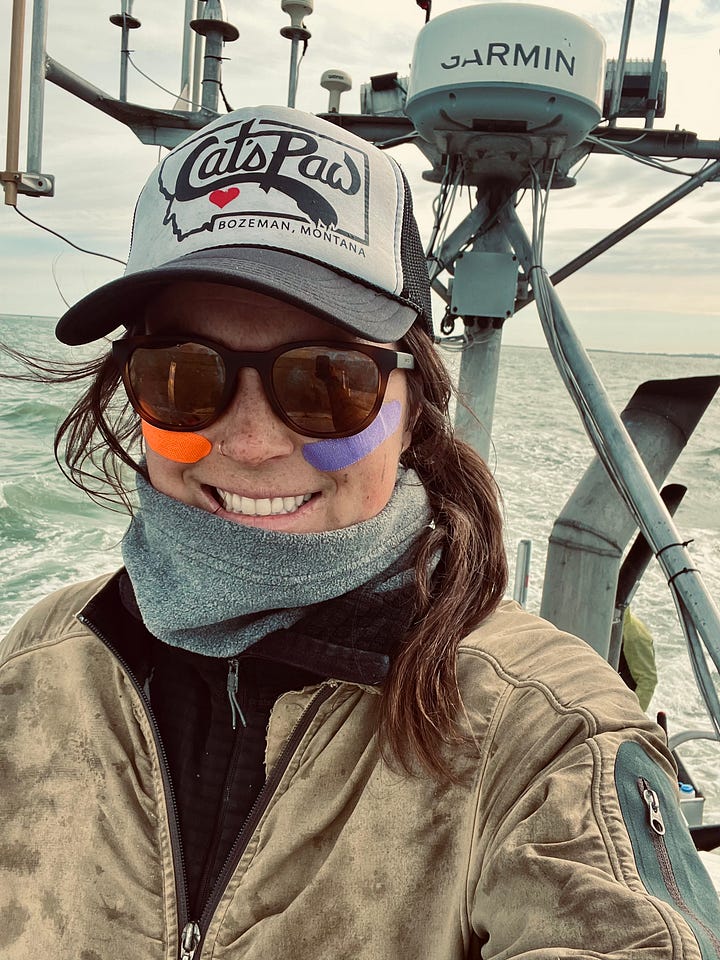
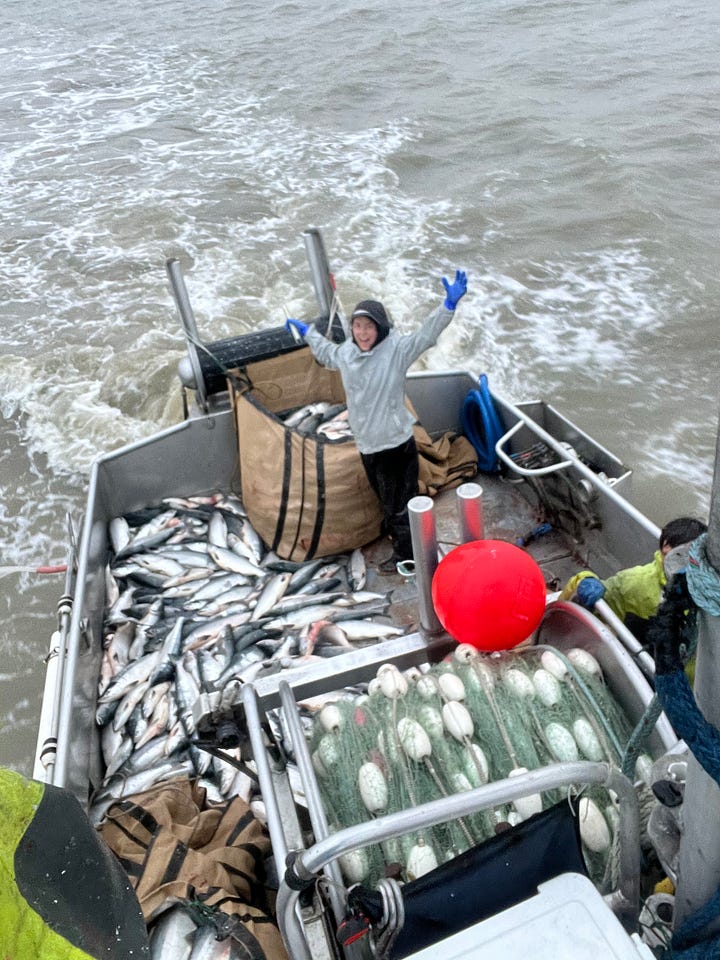
Wow. Less than 10 female captains out of 1,000.
Yeah, there's a few more now. It's been really cool. I've had 2 females that have worked for me who went on to buy their own boats. It’s becoming much more common, which is awesome, though the percentage continues to be very low. There's no reason women can’t do this. It’s definitely been a man’s world historically and largely still is. The hardest part of the job is not sleeping, and women are just as tough as men. The belief system is slowly changing.
Say more about not sleeping.
It's the worst part. I love getting 10 hours of sleep. During the season, you usually get 2 or 3 hours a night for weeks on end. I'm getting better now. I have a great crew that I can rely on to run the boat so I can take a little bit of a longer nap. But the first year, I would stay up until I started seeing things in the water. It’s a short, condensed season that is very intense.
If you're sleeping and someone else is up catching fish, then they catch them and you don't. You really have to push the boundaries of what you think you can do. We go out for 6-8 weeks at a time and don’t touch land the whole time. The state of Alaska has done a great job managing its resources. The priority for them is the returning spawn of salmon and the commercial harvest comes second to that. The runs have been really consistent and strong for the last 6 years. If they have a lot of fish, the state might say, “You're open to fish for the next 72 hours.” You don't know if you’ll be allowed to keep fishing after that or if they are going to close you down, so you fish for those 72 hours without ever stopping. There have been years where it’s been open for a month straight and you don’t ever stop.
I found this old interview of yours where you said that one of the things you loved about the job was the adrenaline and nonstop learning. Can you just talk more about that? What have you learned from being a fishing captain that has applied to the bigger picture of your life?
The adrenaline part has always been something I love. I ski raced for a long time and love to mountain bike and ride snowmobiles. It’s all very exhilarating, and I think it takes you out of your brain for a bit, which is really important for me. I actually struggle to make small decisions. I'm a bit of a perfectionist. The big decisions when something's very stressful or there's a ton of adrenaline are easy. My brain turns off, and I don’t worry about being perfect. I feel really confident and calm. My decisions may not end up being the best ones, but they usually work out all right.
The little decisions are actually really hard for me. I think that's something that fishing has taught me. It's helped me recognize why I like to put myself in those high-stress environments and helped me recognize that I need to work on making smaller decisions. Decision-making is my current self-improvement thing. I’m really trying to trust the fact that decisions aren't necessarily good or bad, they’re just decisions, and there’s probably not a perfect one. You make them and you keep rolling.
The other big thing I’ve learned from fishing is deriving confidence from pushing myself and accepting where I’m at, like we talked about before. Owning where you're at in the learning process is hard because how well you're doing is so tangible in fishing. It's a number. At the end of every season, there is a number showing how many pounds you caught and every other boat around you also has a number. It's very clear where you are in the ranking compared to others. It is so difficult for me, especially because I'm incredibly competitive, not to base my self-worth on what that number is compared to others. I could have a goal preseason that we exceed by double but if I'm still below other people, I might not be happy or proud of our result. It's not completely fixed by any means. I will probably work on this my entire life. I feel like that’s why the earth sent me towards fishing. The universe wanted me to be able to feel confident and proud of myself without having to compare myself to others. That's a huge lesson that I've been trying to take from fishing and hopefully, one day, I'll be really good at it. And for now, I'm still just gonna keep trying to be proud of what I've done without having to compare myself to other people.
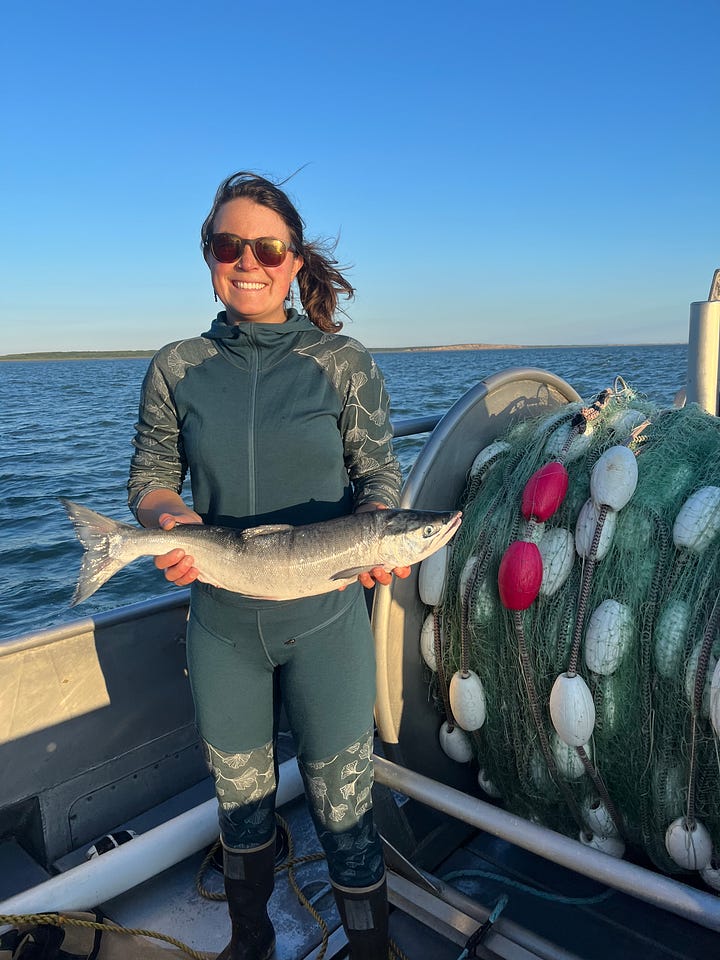
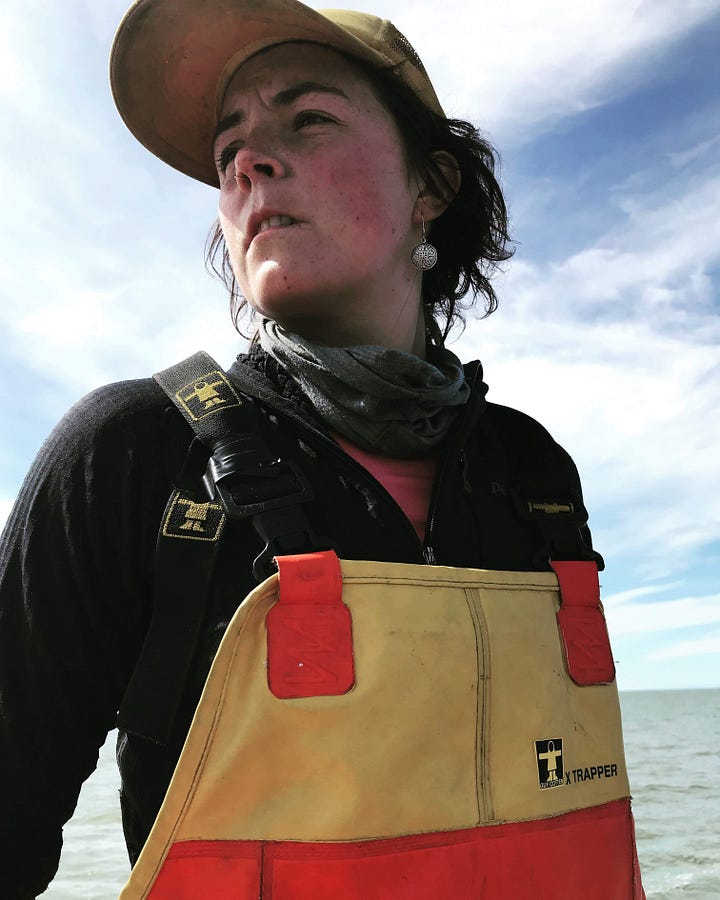
There's so much uncertainty around what you do. Everything from when the Alaskan government will let you fish to how many fish you’ll be able to catch in a season. How do you feel like your relationship with uncertainty has changed as a result of being in this profession?
It's challenging to not know where you're going. I just bought a new boat. I thought the sale of my old boat was going to go through and it didn't, so now I'm stuck with 2 boats. There are lots of financial complications that go along with that. You have to accept that there is always going to be uncertainty and you can’t control it. I can't make anything happen besides working hard. That's really all I can do. You're never stuck. My sister says that to me all the time. You're never stuck. You can always shift. If this is not working at some point, I can shift as long as I’m willing to put myself out there. There are so many options available to people. It calms me a bit to know that even though you can't control the way things go, you can always create a backup option.
What have you learned about being a good leader and a good boss?
For years, when I worked for other people, I kept notes of things I liked and didn’t like that other people did when they were in charge. I had notes from lots of different operations, and I didn't review them when it came time for me to be in charge! It’s interesting to actually go back now and see what I’ve learned. It's not complicated. It's being really fair and really consistent with people. A lot of open communication. You have to rip off the bandaid - passive communication never works. Even if it's uncomfortable for a few minutes, it's going to make the entire rest of the season more comfortable. I mean, we live together on this boat, where my feet are touching one of my crewman's feet. We have no space to get away from each other. You have to be able to confront things, talk about them, and make peace with each other.
Showing confidence is also huge. That's where the “fake until you make it” comes in. You're seeing other people around you maybe catch more fish than you are and you're wondering, “Am I in the right place, or should I move here?” There’s the constant questioning of: “Am I doing it right? Am I good enough?” But your crew has to believe in you. It's really important that they trust you and see you work hard. That’s one thing I didn’t get the first couple of years. You can't share those doubts with your crew. You can share them with your partner or your family or someone who’s not in the boat. That's a great safe space. My husband unfortunately gets a lot of phone calls! Your employees need to believe in you, and you need to create a positive environment for them.
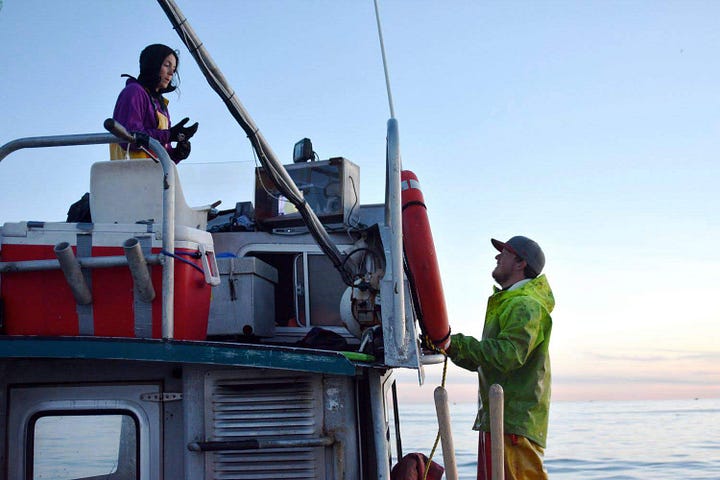
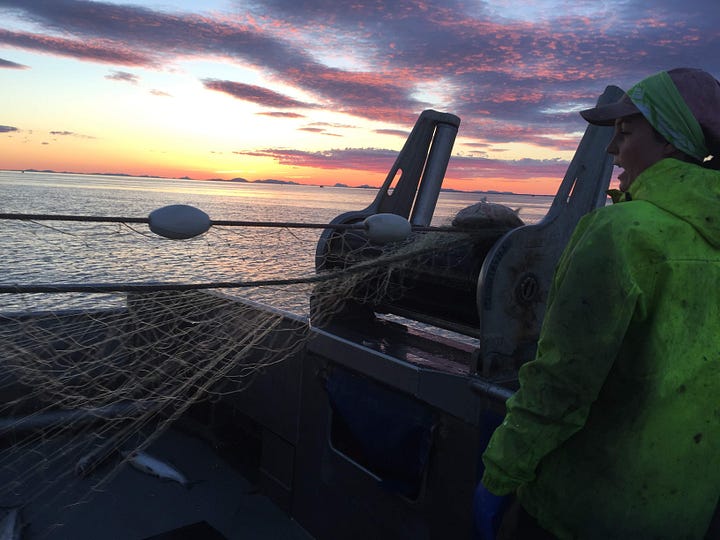
A lot of the people who appear in the blog have built a life that's uniquely theirs in terms of where they live, what they do for work, and how they build their lives. What is this life that's uniquely yours starting to look like?
I'm embarking on a new adventure right now and trying to expand the fish sales part of the business. I feel really confident with the catching fish part of the business so I'm trying to expand the fish sales back home, partially so I can spend more time at home. People idealize lifestyles like mine where I have a ton of freedom to be wherever I want outside of the season in Alaska. I can set my own schedule. As I've gotten older I've really loved my time home. I didn't know that I would feel that way, and so I've been trying to prioritize and shift things so that I can be here. I love my puppy, and I got married this August so I’m figuring that out. My husband also runs 2 businesses. We're both all over the place. Nothing that we do is normal so trying to get some schedule to our lives has been really important.
That being said, right after I get off the boat next summer, I'm going to Mongolia for a month to go ride horses. After this, I'm going to ride snowmobiles and maybe do some winter camping. I want to live an out-of-the-box life but be home a bit more. That’s been a recent realization for me, and something I’m working towards.
What’s next for you and the business?
Like I mentioned earlier, I bought this new boat. It’s exciting but also scary because it wasn't actually the best financial decision, and I knew that in advance. I don't ever do that. I'm very analytical and have 45,000 spreadsheets with every calculation I could possibly need. That said, I was ready for a bit more peace. My old boat was built in the 70s. I put so much time, energy, and work into it. I cried when I posted it for sale.
I knew that I wanted to spend some more time at home and that would mean having something newer. So I did it. It was a big transition that I've never really allowed myself to do before. So I have this new boat now, which is really exciting, and also really terrifying. The loan payments are definitely not the same size as my old ones!
I'm also really trying to expand the fish-selling side of the business. That’s challenging for me because I'm horrible at social media and technology. I feel out of my element. Even though it's not as exciting as running a boat in Alaska and being out in the wild, it's still a big new venture.




